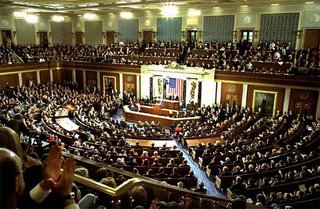 Right now is appears likely the Democrats will earn a small majority in the House of Representatives in elections two weeks from now. Who will rule the Senate after November 7th is too close to call at this time but whichever party wins will rule by a narrow margin. Of course, the White House remains in Republican control for two more years.
Right now is appears likely the Democrats will earn a small majority in the House of Representatives in elections two weeks from now. Who will rule the Senate after November 7th is too close to call at this time but whichever party wins will rule by a narrow margin. Of course, the White House remains in Republican control for two more years.All of this raises the question of how we will govern ourselves for the next two years. The ruling party in whichever branch of Congress or the White House can try to force its agenda through. Another possibility is complete gridlock. However, there remains a third possibility – bipartisan cooperation. Given the current political climate, this will require some willingness to compromise not only by elected officials but also by their constituents. Issues like North Korea and Social Security have been ignored too long and need attention with solutions as close to a consensus as possible.
Jordan Tama in the PSA Blog offers a few suggestions to at least start the dialog:
…the country would be better served if elected officials more often
sought consensus on national security issues, rather than only using them to
score political points. This is much easier said than done—and it’s particularly
easily said by someone like me who does not hold public office. So instead of
just offering moral exhortation, I’d like to make a few concrete
suggestions:
1) Employ more advisory commissions. Bodies like the 9/11 Commission can play a unique role in building consensus on contentious issues by facilitating frank discussion among an ideologically diverse and respected group of people. Congress and the administration recognized this valuable role of commissions in establishing the Iraq Study Group earlier this year. At a time when policymakers don’t agree about what to do in Iraq, the study group’s bipartisan character gives it the potential to rally broad public support around a new set of carefully considered proposals. The country might benefit from the establishment of similar bodies to make recommendations on thorny issues such as U.S. policy toward North Korea, Iran, and Darfur.
2) Create vibrant public media. The ideological balkanization of public debate is fostered by the relative poverty of American public media. PBS and NPR do much excellent work, but their limited resources hamper their capacity to develop innovative programming. I think we should be investing far more in public media—not just so that PBS and NPR can expand what they already do, but so that they, or other entities, can develop dynamic and cutting-edge programs that appeal to people who find them uninteresting today, while preserving their nonpartisan and educational character.
3) Establish nonpartisan seating arrangements in Congress. I borrow this idea from a comment on Victoria’s post by MMS from WA. If members of the House and Senate were required to sit on the floor of Congress and in committee rooms in alphabetical order, rather than by party affiliation, they might get to know members of the other party a little better. Tom Kean and Lee Hamilton
explain in Without Precedent that they employed a variant of this approach in
9/11 Commission meetings, requiring seats to alternate between Republicans and
Democrats. This simple change would be far from a cure-all for corrosive
partisanship, but it might encourage people of different political stripes to
engage with each other more—and even, dare I suggest, to become
friends.
No comments:
Post a Comment